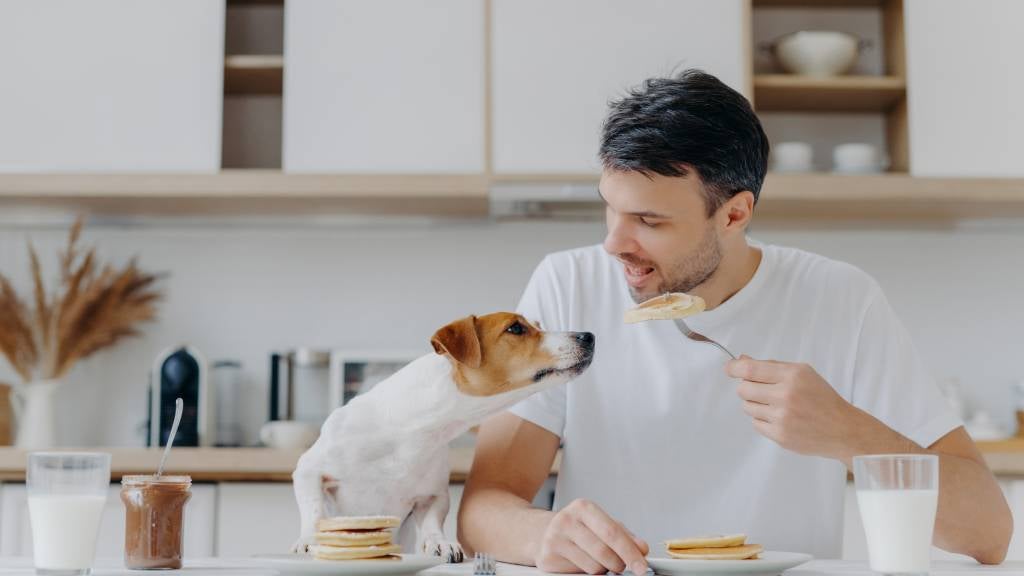Guide to avoiding toxic food for dogs

Written by Simon Jones For Guardian Insurance
Expert Commentary provided by Dr Nicole Rous
Every pet parent wants to keep their furry friend happy and healthy, and avoid emergency vet visits if they can. We spend our hard-earned money getting them the comfiest bed to sleep on, take them for walks every day to keep their body and mind in tip-top shape, and take careful steps to avoid bad behaviours, like non-stop barking due to separation anxiety.
But when it comes to food, it’s easy to give into those puppy-dog eyes. The problem is that if you don’t know what is and isn’t toxic for dogs, you could be putting your best bud in harm’s way. We spoke to dedicated vet Dr Nicole Rous about some of the most common things that are toxic to dogs – from household items to common ingredients in our favourite meals. Now you’ll know exactly what to avoid giving to your pooch.
Chocolate and baked goods
Many baked goods and chocolate can be harmful to dogs because of ingredients like cocoa, cocoa butter, caffeine, and certain artificial sweeteners like xylitol. Chocolate, specifically, contains theobromine and caffeine, which dogs metabolise slower than humans. This can lead to vomiting, diarrhea, increased heart rate, seizures or even death.
While small amounts might not immediately cause harm, it’s a good rule of thumb to avoid giving any of these treats to your dog altogether.
Fruits and vegetables dogs can’t eat
While absolutely delicious, there are many fruits and veggies that dogs simply shouldn’t eat. The good news is there are plenty of fruits and vegetables that can – and should – be part of their balanced diet, but make sure you steer clear of these ones:
- Grapes
- Raisins
- Some berries like juniper berries
- Onion
- Garlic
- Watermelon seeds and rind
- Avocado
There’s more fruit and veg to the list, so always do your research on toxic foods before feeding food scraps to your four-legged friend!
Raw meat and bones
It’s a topic of contention among many pet owners, but raw meat can contain harmful bacteria like salmonella and E. coli – both of which may lead to gastrointestinal issues and potentially severe infections.
While your dog might salivate over them, bones can easily splinter and cause choking hazards, gastrointestinal blockages or even perforations of their digestive tract. Bones can also wear down their teeth or even break them. Instead, give them cooked meat such as chicken without bones to satisfy their ‘meat tooth’.
Ingredients that can harm your dog
Be wary of giving your dog anything that contains artificial preservatives, as many might be harmful to your pet. It’s best to have the mentality of, ‘If I don’t know exactly what’s in this, I shouldn’t feed it to my pet!’ – it’s better to be safe than sorry.
Xylitol
Some things that humans can safely consume are highly dangerous for dogs, like chewing gum. Certain gum products contain xylitol which should be kept out of reach of pets – or better yet out of the home entirely. This is because xylitol is extremely toxic to dogs and has been known to cause serious injury and even death. Even small amounts can cause hypoglycaemia (low blood sugar), seizures, liver failure or worse.
Other common ingredients include food dye, corn syrup, monosodium glutamate (MSG), and ethanol (found in alcohol and raw yeast dough).
Be smart about treats
When it comes to treats for your doggo, Dr Rous says that rawhide is the top one to avoid.
“It is so chemically treated with carcinogens that it’s incredibly dangerous,” she says, “Many treats are just packed with cheap filler ingredients and sugar.”
“My main advice to pet parents about food and treats is to turn the pack over and read the ingredients. So many people just read the marketing on the front, but once you read the ingredients you will see there are so many nasty ingredients. Carbohydrates should never be the number-one listed ingredient – it’s suggestive of a cheap treat,” Dr Rous says.
Quality pet food, not the cheap stuff
If there are ‘bad’ treats out there, then it stands to reason that there are also poor-quality dog food products. Dr Rous explains that this is an unfortunate truth, and many owners don’t realise that they are feeding their furry family members food that isn’t good for them.
“Highly heat-processed food (kibble) needs to be fed with care as they can contain toxic by-products and chemicals,” Dr Rous says.
“Pets benefit from being fed real, whole foods just like we do. However, they need all their essential vitamins and minerals, so pet parents need to make sure they’re buying a complete and balanced diet compliant with PFIAA standards.”
“As with treats, carbohydrates should never be the number-one ingredient. I would steer clear of any food that has ‘meat meal’ in their ingredients list as it suggests cheap ingredient sourcing compared to something like ‘chicken meat’ where they’re more specific about what they’re using,” she adds.
Watch out for toxic pet products
Another top tip from Dr Rous is to beware of cheap and potentially dangerous items that are designed for pets.
“There’s a lot of toxicity in toys and bowls out there that pet parents use,” she says. “For example, chemicals sprayed as flame retardants, or plastic leaching out of water bowls. My rule is if it smells like a chemical, it’s bad news!”
These preservatives may be found in dog food and treats specifically, which are also used in things like pesticides, meaning they are not suitable for your pet:
- Sodium Hexametaphosphate
- Butylated hydroxyanisole (BHA)
- Butylated hydroxytoluene (BHT)
- Carrageenan
- Ethoxyquin
- Nitrates and nitrites
- Propyl gallate
What to do in an emergency
If your pet ingests something toxic, immediately contact your vet or an animal poison-control centre for guidance. If possible, identify the substance ingested and the quantity and time of ingestion.
Most importantly, do not try to induce vomiting unless instructed to by a professional – otherwise it can make certain poisonings even worse. What’s most important is to keep your pet calm and monitor for symptoms like vomiting, diarrhea, lethargy or seizures.
Signs of food poisoning in dogs
- Vomiting
- Diarrhea
- Lethargy
- Loss of appetite
- Abdominal pain or discomfort
- Dehydration
- Tremors or seizures
- Weakness
- Excessive drooling
- Changes in their behaviour or activity level
If you notice any of these worrying signs, contact your vet as soon as possible for treatment.
Other household items harmful to dogs
Did you know that many of the things you use around your home on a daily basis are actually deadly to animals? Dr Rous says it’s important to take stock of what’s in your house so you can keep them away from curious canines.
“Artificial fragrance is at the top of my avoid list for pets,” Dr Rous says, “Think candles, plug-in fresheners and sprays. They commonly contain a class of chemicals called phthalates, which have been shown to impact everything from the gut biome to hormone function.”
Harsh cleaning products can also cause a toxic burn when ingested – so it’s best to keep them well out of reach from prying pups.
“Just imagine your pet licking any surface in a similar way to a baby doing it. If they’re not super gentle and safe for babies, they’re not safe for our pets. They also contain antibacterial agents which, when inhaled or ingested, can affect their gut biome and cause anything from gut issues to mental health issues.
“Also be careful with indoor plants. Some are okay and some are toxic. If you’re unsure, they can be easily googled – lilies are one of the most common,” she says.
Protect your pooch
While you take care of your dog’s health and wellbeing at home, consider protecting yourself financially for certain unexpected vet costs due to injury or illness with Guardian Pet Insurance. Speak to the team at Guardian Insurance today or get a quote online to cover your furry friend.
15 May 2024
